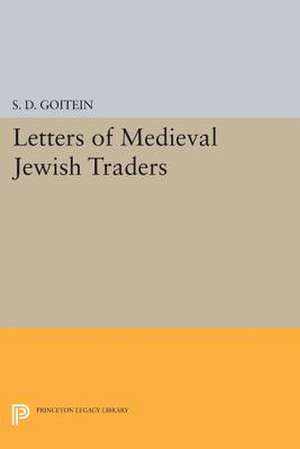Letters of Medieval Jewish Traders: Princeton Legacy Library
Autor S. D. Goiteinen Limba Engleză Paperback – 15 feb 2015
| Toate formatele și edițiile | Preț | Express |
|---|---|---|
| Paperback (1) | 462.57 lei 43-57 zile | |
| Princeton University Press – 15 feb 2015 | 462.57 lei 43-57 zile | |
| Hardback (1) | 928.70 lei 43-57 zile | |
| Princeton University Press – 18 apr 2016 | 928.70 lei 43-57 zile |
Din seria Princeton Legacy Library
-
 Preț: 437.79 lei
Preț: 437.79 lei -
 Preț: 172.27 lei
Preț: 172.27 lei - 16%
 Preț: 683.62 lei
Preț: 683.62 lei - 16%
 Preț: 2324.07 lei
Preț: 2324.07 lei -
 Preț: 376.98 lei
Preț: 376.98 lei - 23%
 Preț: 780.24 lei
Preț: 780.24 lei -
 Preț: 377.30 lei
Preț: 377.30 lei -
 Preț: 313.18 lei
Preț: 313.18 lei - 16%
 Preț: 882.79 lei
Preț: 882.79 lei - 16%
 Preț: 736.39 lei
Preț: 736.39 lei - 16%
 Preț: 860.07 lei
Preț: 860.07 lei -
 Preț: 362.12 lei
Preț: 362.12 lei -
 Preț: 223.24 lei
Preț: 223.24 lei -
 Preț: 363.10 lei
Preț: 363.10 lei - 16%
 Preț: 915.46 lei
Preț: 915.46 lei -
 Preț: 340.21 lei
Preț: 340.21 lei - 16%
 Preț: 835.11 lei
Preț: 835.11 lei -
 Preț: 266.84 lei
Preț: 266.84 lei -
 Preț: 317.65 lei
Preț: 317.65 lei -
 Preț: 329.09 lei
Preț: 329.09 lei -
 Preț: 265.73 lei
Preț: 265.73 lei -
 Preț: 260.54 lei
Preț: 260.54 lei -
 Preț: 314.84 lei
Preț: 314.84 lei -
 Preț: 402.66 lei
Preț: 402.66 lei -
 Preț: 464.18 lei
Preț: 464.18 lei -
 Preț: 351.09 lei
Preț: 351.09 lei -
 Preț: 483.81 lei
Preț: 483.81 lei - 19%
 Preț: 500.29 lei
Preț: 500.29 lei -
 Preț: 388.44 lei
Preț: 388.44 lei -
 Preț: 328.48 lei
Preț: 328.48 lei - 23%
 Preț: 742.04 lei
Preț: 742.04 lei -
 Preț: 372.92 lei
Preț: 372.92 lei -
 Preț: 328.70 lei
Preț: 328.70 lei - 19%
 Preț: 505.89 lei
Preț: 505.89 lei -
 Preț: 446.25 lei
Preț: 446.25 lei -
 Preț: 289.17 lei
Preț: 289.17 lei - 19%
 Preț: 575.53 lei
Preț: 575.53 lei -
 Preț: 447.20 lei
Preț: 447.20 lei -
 Preț: 484.19 lei
Preț: 484.19 lei -
 Preț: 271.12 lei
Preț: 271.12 lei -
 Preț: 314.46 lei
Preț: 314.46 lei -
 Preț: 362.51 lei
Preț: 362.51 lei -
 Preț: 307.07 lei
Preț: 307.07 lei - 19%
 Preț: 498.46 lei
Preț: 498.46 lei -
 Preț: 272.27 lei
Preț: 272.27 lei - 19%
 Preț: 458.44 lei
Preț: 458.44 lei -
 Preț: 406.20 lei
Preț: 406.20 lei - 19%
 Preț: 515.73 lei
Preț: 515.73 lei -
 Preț: 428.88 lei
Preț: 428.88 lei -
 Preț: 369.27 lei
Preț: 369.27 lei
Preț: 462.57 lei
Nou
Puncte Express: 694
Preț estimativ în valută:
88.51€ • 92.66$ • 73.24£
88.51€ • 92.66$ • 73.24£
Carte tipărită la comandă
Livrare economică 07-21 aprilie
Preluare comenzi: 021 569.72.76
Specificații
ISBN-13: 9780691618777
ISBN-10: 0691618771
Pagini: 382
Dimensiuni: 156 x 234 x 25 mm
Greutate: 0.54 kg
Editura: Princeton University Press
Seria Princeton Legacy Library
ISBN-10: 0691618771
Pagini: 382
Dimensiuni: 156 x 234 x 25 mm
Greutate: 0.54 kg
Editura: Princeton University Press
Seria Princeton Legacy Library
Descriere
Descriere de la o altă ediție sau format:
Modern international business has its origins in the overseas trade of the Middle Ages. Of the various communities active in trade in the Islamic countries at that time, records of only the Jewish community survive. Thousands of documents were preserved in the Cairo Geniza, a lumber room attached to the synagogue where discarded writings containing
Modern international business has its origins in the overseas trade of the Middle Ages. Of the various communities active in trade in the Islamic countries at that time, records of only the Jewish community survive. Thousands of documents were preserved in the Cairo Geniza, a lumber room attached to the synagogue where discarded writings containing
